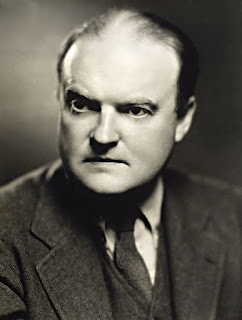24. Edmund Wilson
“There is in most of us an unreconstructed Southerner who
will not accept domination as well as a benevolent despot who wants to mold
others for their own good.” -Edmund Wilson
When I
saw the poet Adam Fitzgerald speak a few months ago in Hudson, NY, he made a
striking observation. The word “we,” he said, was the most violent expression in
the English language. It was little more than an offhand comment and he didn’t
elaborate but I well knew what he meant—or at least I think I did. Reflecting
on his remark, I flashed on all the times I’ve presumptuously used the word
“we” in my critical writing, claiming to speak for all of my readers, to assert
my own experience as universal. I had vaguely considered before that this is
what I might have been doing, but only now was I forced to acknowledge it.
Above all, what Fitzgerald seemed to be getting at in his comment was that the
user of the first person plural always ignores the potential privilege that can
make the writer’s experience considerably different from the reader’s. This is
especially true when the term is employed by white guys like Fitzgerald and me.
Or like
Edmund Wilson. Wilson, the quintessential 20th century man of
letters, and a far more interesting critic than that descriptor implies, is as
free and easy with his “we”s and “us”s as any white guy writer you could conjure
up. In picking a passage from his 800-page study of American Civil War
literature, Patriotic Gore, I could have gone with literally hundreds of
excerpts in which his choice of pronouns aims to universalize the personal. I hit
on the citation above, which comes toward the end of a lengthy chapter on the
writings of Alexander Stephens, the Vice President of the Confederacy, because
it represents a particularly troubling moment in a book full of troubling
moments.
Patriotic
Gore, which was published in 1962 to coincide roughly with the centennial
of the Civil War, is not having any of the positivist platitudes with which the
country greeted the commemoration. A study largely of the ephemeral writings of
the war (letters, journals, diaries, as well as some memoirs, novels, and poetry, though
notably no slave narratives), Wilson’s book aims to bring out the real attitudes
people held about the war through a close study of documents that few
non-historians would see any need to pore over, in a way that is nonacademic
and highly readable. And in this he succeeds wildly, offering up a lively,
intelligent, and highly entertaining survey of the sub-belletristic writings of
a perhaps not so bygone era.
But what
Wilson is really after is to puncture the myths on both sides of the aisle—the
Northern belief that it was serving the side of God (or at least history) and
the Southern chivalric ideal—and this is where things get dicey. You see,
Wilson doesn’t believe that the Civil War was really about slavery and he is
even sympathetic to Southern claims of state’s rights and to the image of the
Southerner (embodied by Alexander Stephens) who will not give in to
“domination” at the hands of the “benevolent despot[s]” from the North. In the
book’s lengthy and infamous introduction, Wilson lays out a conception of war
as being akin to a sea slug swallowing up another slightly smaller sea slug; armed
conflict is never about anything that it claims it’s about but always about
power and domination. This is a very appealing theory and one that it’s
tempting to sign on to until you (presumptuous word) remember slavery… or
Hitler… and then, well, things get all mixed up, especially if you, like me and
Edmund Wilson, are staunchly anti-war on principle.
By
presuming that every reader, by which, one imagines, Wilson means every white
guy reader, has a bit of both Stephens and Lincoln (the quintessential “benevolent
despot” who Wilson finds not so benevolent) warring for his soul, the celebrated
critic missteps. Nothing thrills me more than idiosyncratic and tendentious
criticism that asserts the full force of the writer’s biases and outré personality,
and Wilson’s book certainly does that. Reading it today, though, it’s hard to
get past his particular interpretation of the Civil War, even if that same
interpretative framework would serve so well for nearly any other war that
America has found itself involved in. By compounding this interpretation by his
ample use of the term that so offends Adam Fitzgerald, Wilson makes sure that
his ambitious, fine-grained study is as maddening as it is thrilling, a
brilliant, misguided work of criticism maudit.



Comments
Post a Comment